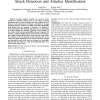Free Online Productivity Tools
i2Speak
i2Symbol
i2OCR
iTex2Img
iWeb2Print
iWeb2Shot
i2Type
iPdf2Split
iPdf2Merge
i2Bopomofo
i2Arabic
i2Style
i2Image
i2PDF
iLatex2Rtf
Sci2ools
131
click to vote
TISSEC
2008
2008
Message Dropping Attacks in Overlay Networks: Attack Detection and Attacker Identification
Overlay multicast networks are used by service providers to distribute contents such as web pages, streaming multimedia data, or security updates to a large number of users. However, such networks are extremely vulnerable to message dropping attacks by malicious or selfish nodes that intentionally drop packets they are required to forward. It is difficult to detect such attacks both efficiently and effectively, not mentioning to further identify the attackers, especially when members in the overlay switch between online/offline statuses frequently. We propose a random-sampling
Related Content
| Added | 15 Dec 2010 |
| Updated | 15 Dec 2010 |
| Type | Journal |
| Year | 2008 |
| Where | TISSEC |
| Authors | Liang Xie, Sencun Zhu |
Comments (0)

